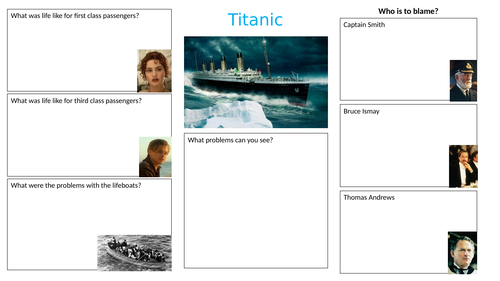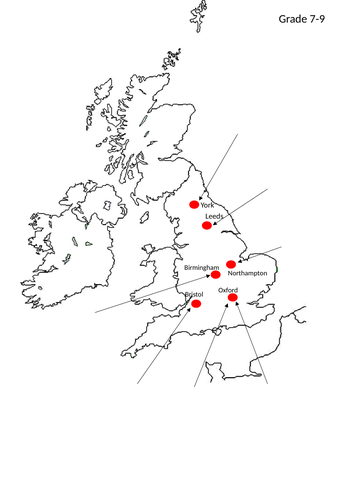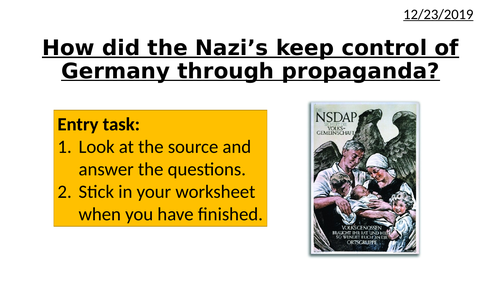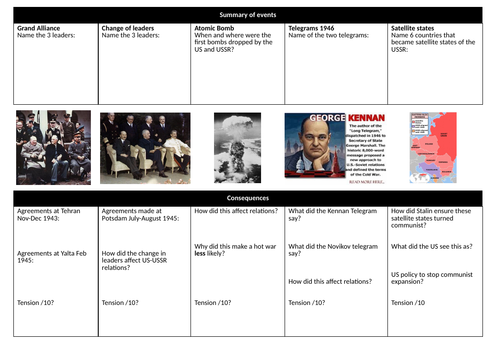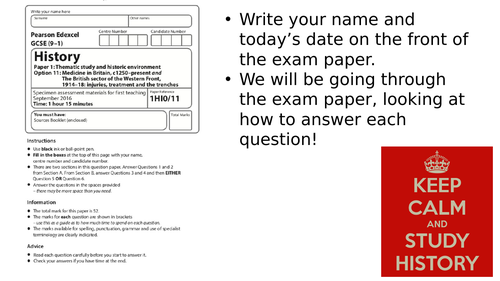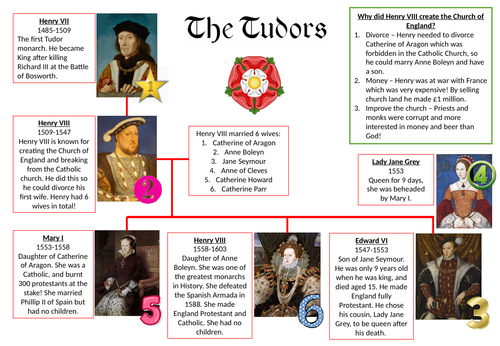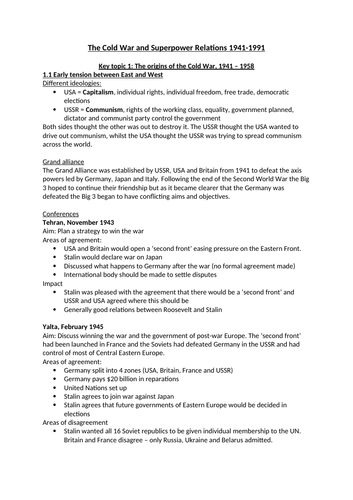338Uploads
118k+Views
41k+Downloads
Featured resources

Introduction to Islam | Islam
KS3 Religious Studies - Lesson 1 of the Islam scheme of work
This lesson looks at an introduction to Islam.
This lesson introduces the religion of Islam. Students will complete a fact file with a differentiated information sheet about Islam. Students will then complete a ‘myth or fact’ quiz about Islam – with explanations and extra information!
All worksheets and resources needed are included – ready to download and teach!
Feedback is welcome, please check out the rest of my lessons in the Islam scheme of work.
Bundle

Historical Skills scheme of work
An entire scheme of work consisting of 5 lessons for teaching Historical skills. Save 25%!
Students will cover the following over 5 lessons;
Introduction to History - What is history, why is it important to study and key historical terminology
What do historians do - Looking at the role of a historian
Understanding chronology - Looking at chronology and understanding timelines
Primary and Secondary sources - How historians find out about the past using primary and secondary sources, also looking at different types of sources and anachronisms
Interpretations - Understanding why historians have different perspectives of the past
Ideal for Year 7 students who are starting History at secondary school! All lessons are fully resourced.
Your feedback is greatly appreciated! Please check out my other lessons and resources on my TES shop for more engaging and effective teaching materials.

Primary and Secondary Sources
A lesson for teaching Year 7 on ‘How do historians learn about the past’. This is part of the ‘Historical Skills’ Scheme of Work, used at the beginning of September for introducing students to studying History.
Students will:
Understand the various methods historians use to study the past.
Learn about different types of historical sources.
Understand the importance of reliability
Be able to recognise anachronisms
Your feedback is greatly appreciated! Please check out my other lessons and resources on my TES shop for more engaging and effective teaching materials.

Weapons of WW1
An interactive lesson for teaching 11-14s on the weapons of WW1. Students make their own Top Trump cards about 7 weapons (ranging from tanks, rifles and zeppelins), using the differentiated information sheets!
All worksheets are provided - including the information sheets and the template for the Top Trumps.
I printed the Top Trump templates onto cards and students were then able to play them in lesson, and take them home to share with family! Students really enjoyed this lesson and they gained an excellent understanding of the weapons.
Please review if you purchase and check out my other resources.

Titanic film worksheet
Worksheet for watching the film Titanic. Print on A3 for the best result!
Students fill in the sheet as they watch the film - looks at:
The differences between first and third class passengers (Rose and Jack)
Problems with the lifeboats
Problems they can see
Who is to blame with a box to fill in on: Captain Smith, Bruce Ismay and Thomas Andrews
Please review if you buy and check out my other resources!

The Battles of the English Civil War
Suitable for teaching KS3 Charles I and the English Civil War.
Whole lesson looks at the battles of Civil War, with a particular emphasis on Marston Moor. The lesson includes differentiated tasks, such as a card sort of the battles either onto a timeline or on a map of the UK. Students also look at Marston Moor in detail and how it was fought.
Please review if you purchase and check out my other Charles I and the English Civil War resources!

Nazi Propaganda
**Whole lesson plus all resources needed for teaching 11-14s ‘How did the Nazi’s keep control of Germany through propaganda?’
**
Students will analyse a variety of Nazi propaganda methods through watching a video (with quiz) and looking at sources.
At the end of the lesson, students will be able to plan an answer one of two differentiated questions;
HA: ‘The use of propaganda was essential in helping the Nazis maintain control over the German people’. How far do you agree with this statement?
LA: Explain how and why Hitler and the Nazis used propaganda.
Please review if you purchase, and check out my other resources on my shop!

How tall are you? HISTORY HEIGHTS DISPLAY
How tall are you compared to famous historical figures?
This is one of my favourite displays I have made! 45 famous historical figures and their HEIGHTS! I have used this in a corridor and students, staff and even parents love comparing their heights to some of the most famous people in history. This is perfect for primary or secondary schools.
All you need is a 2 metre ruler stick so you can accurately position the faces of the famous people. Included in this pack are:
Pictures of all 45 people
Labels showing their name and height
Included are a huge range of historical figures; from science, literature, music, art, world leaders and more!
It is great fun seeing students line up against famous historical people and comparing their heights.
Feedback is welcome.

Cold War | Origins Timeline
For teaching Edexcel GCSE 9-1 Superpower Relations and the Cold War 1941-1991
Revision lesson - Timeline of the Origins of the Cold War. The timeline analyses key events from 1945-1956 and assess how much tension each event caused.
Please review if you purchase and check out my other Cold War lessons and resources!

Historical Interpretations
A lesson for teaching Year 7 about ‘Why are there different interpretations of the past?’ This is part of the ‘Historical Skills’ Scheme of Work, used at the beginning of September for introducing students to studying History.
Students will:
Understand that history can be interpreted in various ways.
Learn the factors that lead to different historical interpretations.
Develop critical thinking skills by examining multiple perspectives on historical events - specifically the Vikings.
Your feedback is greatly appreciated! Please check out my other lessons and resources on my TES shop for more engaging and effective teaching materials.

GCSE Medicine Paper 1 Exam Skills
This is a lesson on exam skills for Edexcel 9-1 Medicine Through Time 1250-Present plus the Western Front (Paper 1)
This whole lesson plus accompanying work booklet breaks down how to answer every question in Paper 1!
Includes:
Example questions
Model Answers
Step-by-step guide
Please review if you buy and check out my other resources on GCSE Medicine Through Time!

Why did the Schlieffen Plan fail?
Suitable for teaching 11-14s WW1 - Why did the Schlieffen Plan fail?
Whole lesson plus all worksheets, this lesson looks at why the Schlieffen Plan failed. It encourages students to come up with their own plan in how to beat France and Russia, and then looks at the source ‘Bravo, Belgium’ for an explanation as to why it failed. The plenary asks students to decide what is the most important reason the plan failed.
Please review if you purchase, and check out my other WW1 resources.

Tudors Knowledge Organiser
Knowledge Organiser for the Tudors, in the form of a family tree with information on each monarch. Also includes a section on ‘Why did Henry VIII create the Church of England’?
Suitable for KS2 and KS3!
Perfect as a revision resource or for sticking in exercise books at the start of a topic.

GCSE Germany | Nazi Propaganda
**For teaching Edexcel GCSE 9-1 Weimar Republic and Nazi Germany 1918-1939
Nazi control and dictatorship
How did the Nazis use propaganda and mass media to control people?
This lesson looks at how Hitler maintained control of Germany through propaganda. This includes;
Who was Joseph Goebbels and why was he so important for Nazi control?
Card sort activity on the different methods of propaganda
Assessing how effective Nazi propaganda was
Source analysis practice
Also included:
Accompanying work booklet to the lesson, with a wide range of fun activities!
20 question quiz plus answers based on the lesson
A ‘how useful’ source question
Please review if you purchase, and check out my other Weimar and Nazi Germany resources.
Bundle

History displays BUNDLE!!
A HUGE bundle of 5 displays! All you need to make your classroom fabulous!
Historical Netflix
Year 9 GCSE options display
GCSE Early Elizabethan England
GCSE Weimar and Nazi Germany
GCSE Medicine Through Time
Please review if you purchase. All displays can be purchased individually from my shop.
Feedback is welcome.

Chronology
A lesson for teaching Year 7 about ‘Understanding Chronology’. This is part of the ‘Historical Skills’ Scheme of Work, used at the beginning of September for introducing students to studying History.
Students will:
Grasp the concept of chronology and its importance in history.
Learn to place historical events in a chronological sequence.
Understand and use timelines to visualise historical periods and events.
Your feedback is greatly appreciated! Please check out my other lessons and resources on my TES shop for more engaging and effective teaching materials.

Hitler Youth Opposition Groups
This whole lesson plus activities and resources looks at Hitler Youth Opposition Groups (Edelweiss Pirates, Swing Youth and White Rose) using a variety video clips and tasks.
Includes optional source work for high ability students or perfect for a top set class!
Suitable for 11-14s.
Please check out my other Hitler Youth resources, feedback is welcome.

GCSE Germany | Stresemann
For teaching Edexcel GCSE 9-1 Weimar and Nazi Germany 1918-1939
The Weimar Republic
How far had the Weimar Republic recovered from its earlier problems 1919-1923?
Students will look at the the main work and achievements of Gustav Stresemann - focussing on his economic and foreign policy and assess how successfully this ‘fixed’ the Weimar Republic. This lesson includes:
Gustav Stresemann source analysis (Gustav as an angel - my favourite source!)
Who was Gustav Stresemann - his aims and objectives
Economic recovery (Rentenmark, Dawes Plan, Young Plan)
International recovery (Locano Pact, League of Nations, Kellog-Briand Pact)
Also included:
Accompanying work booklet to the lesson, with a wide range of fun activities!
20 question quiz plus answers based on the lesson
Please review if you purchase, and check out my other Weimar and Nazi Germany resources.

Revision notes for Superpower Relations and the Cold War GCSE
A set of revision notes for Edexcel GCSE Superpower Relations and the Cold War. All topics broken down, each key unit is about 5 pages long. Use for revision with you classes.

How can religion answer Big Questions?
KS3 Philosophy and Ethics - Lesson 5 of the ‘What Big Questions are there?’ Scheme of Work.
This lesson looks at 'Can religion answer the Big Questions?
This lesson looks at why does God allow suffering and how religion may be able to answer some of life’s big questions.
By the end of the lesson, students will be able to:
Judge which reason you believe has the strongest argument and explain your personal view about why bad things happen.
Explain with examples different reasons God allows bad things to happen.
Consider reasons why God allows bad things to happen.
Feedback is welcome, please check out the rest of my lessons in the ‘What Big Questions are there?’








